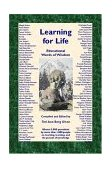


Abraham Lincoln: “The Great Emancipator”Abraham Lincoln was born on February 12, 1809 in a log cabin in Kentucky. He moved with his parents and an older sister, Sarah, to the backwoods of Indiana when he was seven. His mother died two years later. They were poor and Abe helped support the family by clearing land, plowing fields, husking corn, splitting logs for fences, doing carpentry work and various odd jobs. But Abe grew up with a keen desire for knowledge. When Abe's father remarried, Abe's stepmother took a special interest in him by encouraging him to read and study. Abe always said that he went to school “by littles,” which meant a few weeks at a time when he was six, seven, eleven, thirteen, and fifteen. However, the sum total of his schoolhouse education did not even amount to one full year. Abe educated himself mainly by reading books and newspapers that he borrowed from others. He studied by firelight, working out arithmetic problems using charcoal on a wooden slate. Later when he was able to obtain paper, he practiced writing in a homemade copybook with a feather pen and blackberry ink. Abe always had a book in his pocket to read out in the field when he had a break between chores. He commented one time that he had “read through every book that he had heard of within a circuit of fifty miles.” His favorites included the Bible, Aesop’s Fables, Robinson Crusoe, The Arabian Nights, Pilgrim’s Progress, Grimshaw’s History of the United States, a biography of George Washington, Shakespeare’s plays, and the poetry of Robert Burns. The family moved to Illinois when Abe was 21, and after helping his father set up a new farm there, he then set out on his own. Lincoln worked as a riverboat pilot, a surveyor, a store clerk, and a postmaster, while in his spare time studying law books and teaching himself to be a lawyer. He liked to tell funny stories, and he made friends easily. Lincoln earned his nickname "Honest Abe" after he went into a partnership and the business failed, but he worked for several years to pay back the store's debts of $1,100. Lincoln was elected to the Illinois legislature in 1834. Three years later, he received his license to practice law and moved to Springfield, where he became a successful lawyer and one of the town's leading citizens. He married an ambitious young woman, Mary Todd, who boasted to her friends that she intended to help her husband become President of the United States. Lincoln was elected to the U.S. Congress in 1847. He did not run for a second term. He became involved in politics again in 1854 when Congress passed a law that made it possible for people to own slaves in the new western territory. While slavery was legal in the southern states, Lincoln felt that a territory that was free must be kept that way. So in 1856 he joined the new Republican Party, which had been formed to fight the spread of slavery. The Republicans nominated Lincoln for the U.S. Congress in 1858. That summer he and Stephen A. Douglas, the nominee of the Democratic Party, held many debates about slavery. Lincoln lost the election, but his speeches during the Lincoln-Douglas debates gave him national recognition. In 1860 the Republican Party nominated him for President and he won. Since he was against slavery, Lincoln's victory worried the South. By the time Lincoln was inaugurated, several Southern states had left the Union. The Civil War began right after Lincoln took office in 1861. Lincoln issued the Emancipation Proclamation on January 1, 1863, which freed all of the slaves. Later that year he gave his famous Gettysburg Address. The end of the war came early in April 1865, soon after Lincoln had begun a second term as President. Lincoln wanted to make it easy for the states that had seceded to take their places again in the Union, but he did not live to carry out his plans. While attending a play at Ford's Theatre in Washington, D.C. on the evening of April 14, 1865, he was shot by a mad southern sympathizer named John Wilkes Booth. A funeral train took Lincoln's body back to Illinois for burial, and mourners lined the tracks all along the way. Lincoln’s kindness, wit, and ability to express great truths in words that everyone could understand had made “Honest Abe” one of our country’s most beloved leaders. REFERENCES
Abraham Lincoln (In Their Own Words Series), by George Sullivan. See Also: Abraham Lincoln: The Boy, the Man, by Lloyd Ostendorf.
Contact: . Thanks! Please click here for reprint permission.


These pages are a continuous work in progress.
|
Help Support this Site
and purchase items via our affiliate links. Thank you!
 
Thank you for visiting my |

